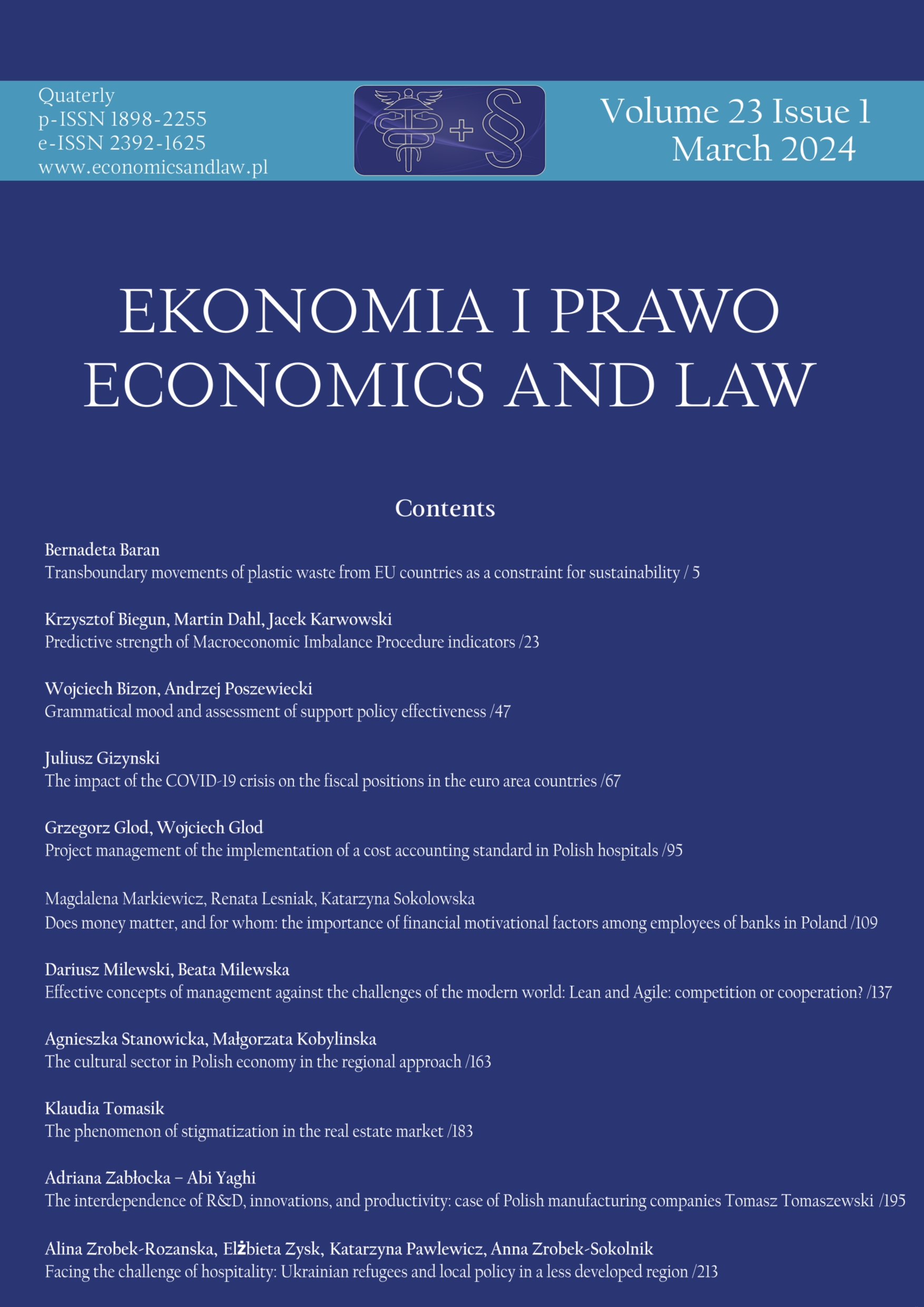The phenomenon of stigmatization in the real estate market
DOI:
https://doi.org/10.12775/EiP.2024.009Keywords
stigmatization, real estate market, restricted use areaAbstract
Motivation: The following article covers the entire path of stigmatization, from that which directly affects a person to special cases of real estate stigmatization. Market participants have created many types of stigmatization that discredit a property. These range from the more abstract ones (e.g., paranormal phenomena taking place on a property or superstition) to the more serious ones (e.g., a restricted use area). The following article focuses on properties located in restricted use areas and the impact of this factor on property values. It analyzes court rulings by Polish courts on compensation in connection with the decrease in the value of real estate due to the establishment of a restricted use area.
Aim: The main goal of the article is to identify the phenomenon of stigmatization in the real estate market, while the specific goal is to identify the phenomenon of stigmatization of real estate in restricted use areas around airports.
Results: One of the main reasons why stigmatization occurs in the real estate market is ignorance and people’s fear of what they don’t know. The most common objects of stigmatization are restricted use areas around airports. However, in the court rulings described in the article, there is no consensus on whether stigmatization of real estate in itself affects the value of real estate.
References
Chapman, D., & Ludlum, M (2014). Teaching stigmatized property: you don’t have a ghost of a chance. Journal of Business Cases and Applications, 11(1), 63–70.
Chapman, D., Ludlum, M., Vijayan, R., Xu, W., Steelman, B., Range, D., & Dehariya, D. (2019). Stigmatized properties and housing values: an exploratory study. Journal of Housing and the Built Environment, 43, 683–696. https://doi.org/10.1007/s10901-019-09662-2.
Goffman, E. (1963). Stigma: notes on the management of spoiled identity. Prentice-Hall.
Habdas, M., & Konowalczuk, J. (2018). Cele i warunki skutecznej interwencji państwa w obszarach ograniczonego użytkowania portów lotniczych. Świat Nieruchomości, 105(3), 5–16. https://doi.org/10.14659/WOREJ.2018.105.001.
Judgment of the Court of Appeals in Warsaw of 24.04.2018 (VII AGa 22/18, VII AGa 22/18) (Poland).
Judgment of the Court of Appeals in Warsaw of 31.05.2019 (VII AGa 168/18 VII AGa 168/18) (Poland).
Judgment of the District Court in Gdańsk of 31.07.2020 (I C 437/18) (Poland).
Judgment of the District Court in Lodz of 29.12.2017 (II C 280/14) (Poland).
Judgment of the District Court in Poznań of 6.10.2016 (XVIII.C. 102/15) (Poland).
Judgment of the District Court of Warsaw of 04.12.2020 (XXVI GC 799/14) (Poland).
Judgment of the Supreme Court of 11.03.2020. (I CSK 568/18) (Poland).
Judgment of the Supreme Court of 30.04.2021 (I CSKP 65/21) (Poland).
Kieniewicz, P. (2008). Stygmatyzacja osób chorych psychicznie jako problem moralny. In I. Mroczkowski, & J.A. Sobkowiak (Eds.), Antropologia teologicznomoralna: koncepcje, kontrowersje, inspiracje (pp. 153–164). UKSW.
Kosche, M. (2011). Ocena stygmatyzacji w świetle życia zasad życia społecznego. Seminare. Poszukiwania naukowe, 29(1), 123–136.
Larsen, J., & Coleman, J. (2001). Psychologically impacted houses: broker disclosure behavior and perceived market effects in an unregulated environment. Journal of Real Estate Practice and Education, 4(1). 1–16. https://doi.org/10.1080/10835547.2001.12091572.
Łojko, M. (2017). Wykluczenie społeczne w Polsce: od teorii do praktyki. In D. Becker-Pestka, G. Kubiński, & M. Łojko (Eds.), Różne obszary wykluczenia społecznego w Polsce: wybrane zagadnienia (pp. 7–42). Exante.
Świgost, M, & Dąbrowska, A. (2017). Właściwości stygmatu a sytuacja życiowa człowieka zagrożonego stygmatyzacją. Studia Edukacyjne, 45, 329–345. https://doi.org/10.14746/se.2017.45.22.
Wacquant, L., Slater, T., & Pereira, V.B. (2014). Territorial stigmatization in action. Environment and Planning A: Economy and Space, 46(6), 1270–1280. https://doi.org/10.1068/a4606ge.
Zięba, M. (2011). Społeczne aspekty rewitalizacji zdegradowanych dzielnic miasta. World of Real Estate Journal, 77(3), 30–35.
Downloads
Published
How to Cite
Issue
Section
License
Copyright (c) 2023 Klaudia Tomasik

This work is licensed under a Creative Commons Attribution-NoDerivatives 4.0 International License.
Stats
Number of views and downloads: 514
Number of citations: 0
